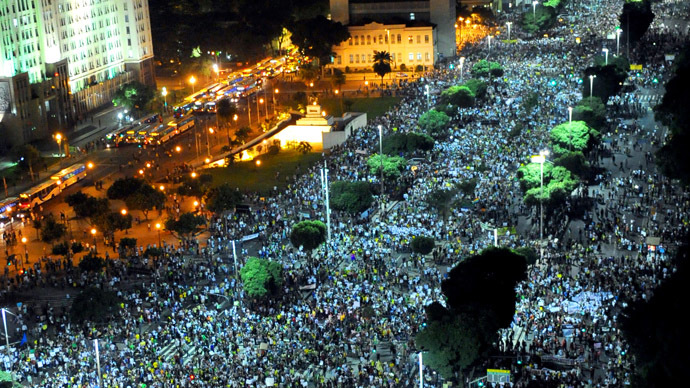by VIJAY PRASHAD
 People march in downtown Rio de Janeiro on June 20, 2013, during a protest of what is now called the ‘Tropical Spring’ against corruption and price hikes PHOTO/AFP/Russia Today
People march in downtown Rio de Janeiro on June 20, 2013, during a protest of what is now called the ‘Tropical Spring’ against corruption and price hikes PHOTO/AFP/Russia Today
What is striking about the protests in Brazil against the Rousseff government is that these are not coming mainly from the slums or the industrial working class. They mark the collective hatred on the part of the elite, of the rich, against a party and a president
Brazil’s modernist plazas have been filled with protesters over the course of the past week. They have come to ask for the resignation of the President — Dilma Rousseff of the Workers’ Party (PT). Crowds on Avenue Paulista in São Paulo held aloft a massive sign that read, “Impeachment já!” It is the slogan of this protest — if President Rousseff does not resign, then she should be impeached.
Why do these thousands of people want Ms. Rousseff to leave office? An eruption of corruption scandals that implicate the entire political elite comes at a time of Brazil’s economic stagnation. Brazil currently suffers its worst recession in half a century, with economic growth shrinking. Low commodity prices and slack demand from China are the main authors of this downturn. No relief is on the horizon, since China is not likely to expand its purchases. Nor, therefore, will commodity prices rise higher. Reliant upon both, an exit for Brazil’s crisis in that direction is closed. The PT, in power from 2002, had not been able to diversify the economy and so was vulnerable to commodity prices. Economist Alfredo Saad-Filho calls this a “confluence of dissatisfactions,” drawing in those with immediate worries — rising bus fares— and those with much greater anxieties — the loss of power of the dominant classes.
Angering the elite
What is striking about the protests against the Rousseff government is that these are not coming mainly from the slums — the favelas — of Brazil or from the industrial working class. In March last year, Brazil’s college educated, upper middle class went out onto the streets for a series of marches against the government. Luiz Carlos Bresser-Pereira, a former Finance Minister from the 1980s, characterised these protests as “collective hatred on the part of the elites, of the rich, against a party and a president.” What motivated the demonstrators, he said, was not worry, but “hatred.” What do the Brazilian elite hate about the government of the PT?
The PT has pushed a broad agenda to give capitalism a human face. Wretched poverty in parts of Brazil had to be ameliorated by a social welfare programme known as Bolsa Família. The World Bank said that this programme has “changed the lives of millions in Brazil.” For cash payments, Brazil’s impoverished families pledge to keep their children in school and take them for regular medical check-ups. The government argued that Bolsa Família would enhance the immediate lives of the poor — with the cash payments — and would break the cycle of intergenerational poverty — through education and health care.
Almost 50 million Brazilians — a quarter of the population — have benefited from Bolsa Família. Last year, the Brazilian Institute of Geography and Statistics announced that extreme poverty has been eradicated in the country. But, at that announcement, the institute pointed out that the budgetary cuts to the programme would reverse the trend. A third of the funds allocated to Bolsa Família had been removed from the 2016 budget. This is an indicator of the financial trials of the government.
What the elite hated was the rise in minimum wages, the expansion of rights to workers and the privileges now given to the working class for entry into public universities. Benefits to the working class in Brazil open up the social question of racial inequality. Brazil, a former slave state, has never really come to terms with the legacies of slavery and racism. Under the PT, issues of racial discrimination and the costs of racism on the workers became part of the national conversation. This was anathema to the elite.
Habits of coups
Over the course of the past century, at regular intervals, populist political movements have come to the fore in Brazil to challenge the iron grip of the elite. Each time, the people rally behind these leaders, the elite — with the assistance of the military and the United States — has undermined the revolt of the favelas and the countryside. Presidents Getúlio Vargas and João Goulart became standard-bearers of this popular frustration, but both had to be removed — Vargas by suicide in 1954 and Goulart by military coup in 1964. In both cases, the combination of the established dominant classes, the military and the U.S. created a crisis that overwhelmed the country and dispatched the populist leaders. Fear that this is part of the equation in Brazil today is not unfounded. It is etched into Brazil’s history.
Alternatives International Journal for more
